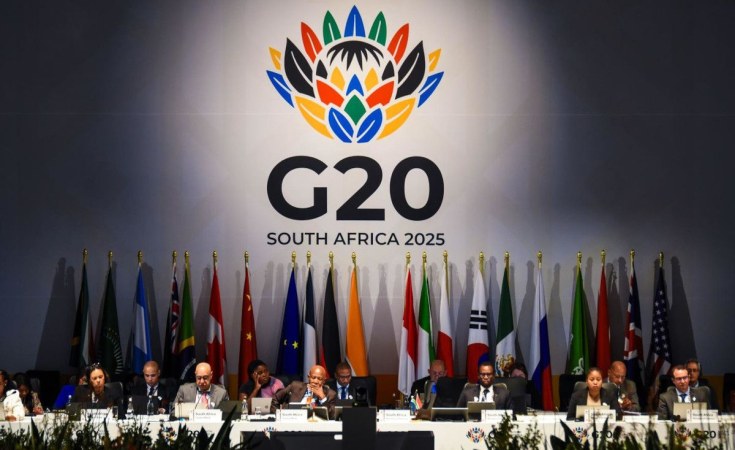1.Background of the Summit
The G-20 Leaders’ Summit in Johannesburg was held in an African country for the first time.
The summit held special significance as:
The African Union (AU) was made a permanent member of the G-20 during India’s presidency in 2023.
This expanded the voice of the Global South within global governance platforms.
2. Key Themes in the Summit’s Declaration
The summit focused extensively on the problems confronting the world:
Multiple global conflicts
Rising inequality
Increasing economic uncertainty
A call for “just, comprehensive, and lasting peace” in:
Sudan
DR Congo
Occupied Palestinian Territories
Ukraine
The declaration invoked commitment to the UN Charter.
3. India’s Key Interventions and Proposals
Prime Minister Narendra Modi participated actively and suggested six major initiatives for global cooperation:
Traditional Knowledge Repository
To preserve and share India’s indigenous knowledge systems.
G20–Africa Skills Multiplier Initiative
India to train 1 million Africans in various skills → strengthens India–Africa ties.
Global Healthcare Response Team
For coordinated medical assistance during global health crises.
Initiative on Countering the Drug–Terror Nexus
Addressing how drug trafficking finances terrorism.
Open Satellite Data Partnership
Sharing satellite information on agriculture, fisheries, disasters, etc.
G20 Critical Minerals Circularity Initiative
Sustainable use and recycling of critical minerals essential for advanced technologies.
Additional Observations:
India had a role in shaping the summit declaration.
Government may have been disappointed with:
A brief reference to terrorism, especially compared to the stronger wording in the 2023 New Delhi Declaration.
Context: the Delhi blast and Pahalgam attack raised expectations for stronger mention.
4. U.S. Boycott of the Summit
President Donald Trump not only skipped the summit but the U.S. government boycotted it entirely, sending only a low-level diplomat as observer.
This is the first-ever U.S. boycott of a G-20 summit.
U.S. justification:
Disagreement with South Africa over “alleged discrimination” against white minority farmers.
Irony Highlighted
Boycotting a nation that suffered discrimination under apartheid is diplomatically contradictory.
5. Implications of the U.S. Boycott
A. Diplomatic and Geopolitical Implications
Raises concerns about U.S. commitment to multilateral forums like G-20, especially as it is set to take over the G-20 presidency in 2026.
Weakens the narrative of G-20 emerging as a:
More inclusive and
More democratic global governance mechanism.
B. Impact on G-20 Functioning
The absence of the world’s largest economy:
Reduces political weight of discussions.
Undermines consensus-building.
Sends negative signals about coordination on global issues.
C. Lack of Strong Criticism
Most leaders did not openly criticise the U.S., highlighting:
Geopolitical constraints,
Diplomatic caution, and
Power asymmetry within global institutions.
6. The Central Message: Ubuntu and Collective Responsibility
The declaration referenced Ubuntu:
“I am because we are” — emphasising interdependence.The editorial argues:
Major powers like the U.S. must respect multilateral groupings.
Undermining platforms like the G-20 threatens global cooperation at a time when the world faces:
Conflicts
Inequality
Economic instability
Climate crises
7. UPSC-Relevant Takeaways
A. Polity & IR
Role of G-20 in global governance.
India’s increasing influence in Global South diplomacy.
U.S. behaviour in multilateral institutions.
B. GS-II Themes
India–Africa relations.
Global multilateralism vs unilateralism.
Importance of collective responses to global challenges.
C. Essay Themes
“Is multilateralism losing relevance?”
“Global South: From marginalisation to leadership.”
D. Ethics Angle
Ubuntu reflects global ethical responsibility, cooperation, and humanitarianism.
8. Conclusion
The U.S. boycott was impolitic and counterproductive.
It undermines global efforts to build a cooperative world order.
At a time of global instability, the spirit of Ubuntu must guide all major powers to strengthen — not weaken — multilateral institutions like the G-20.







